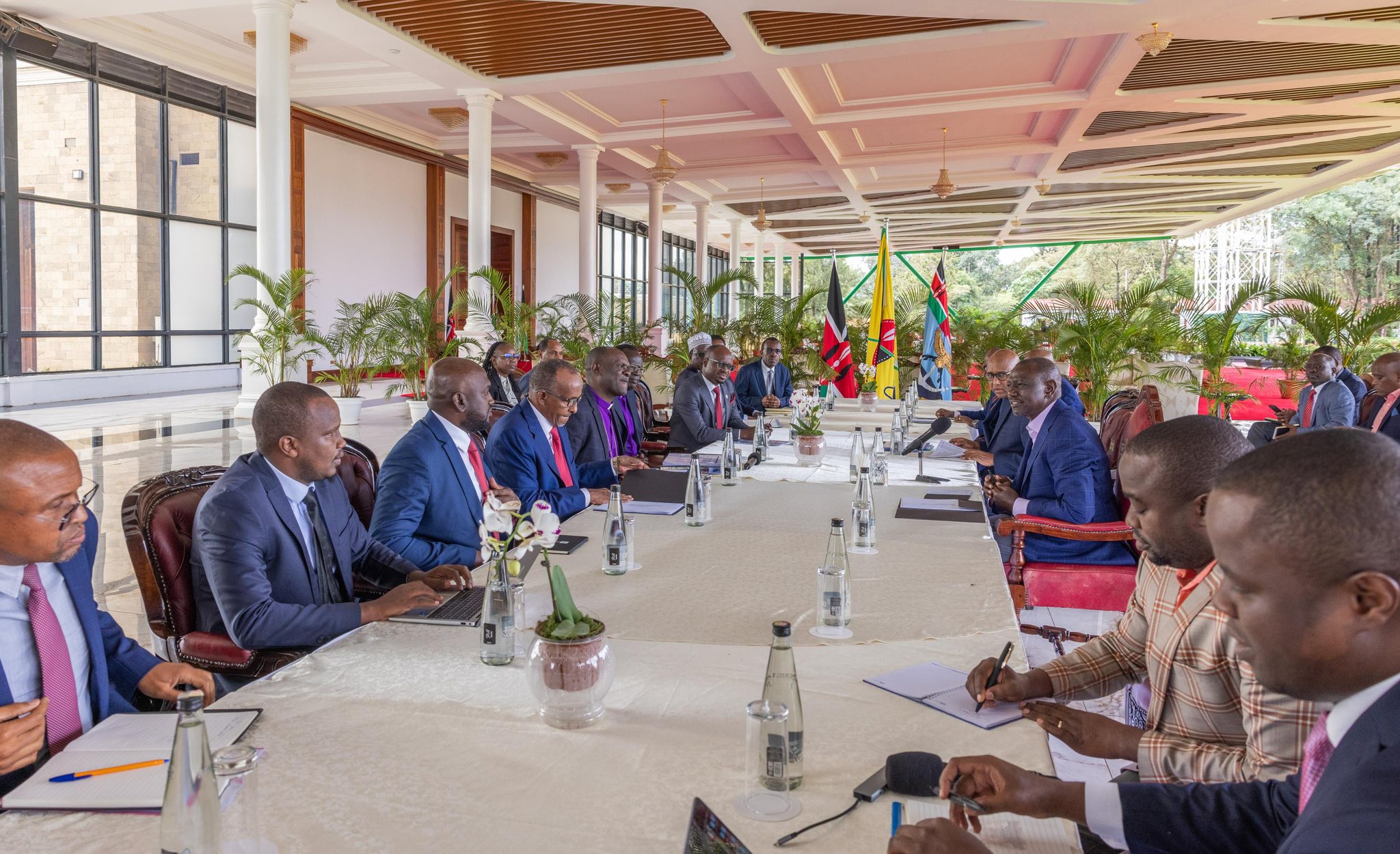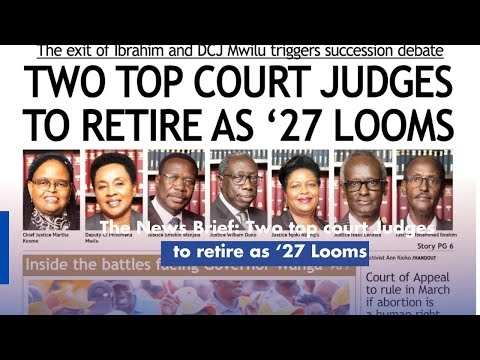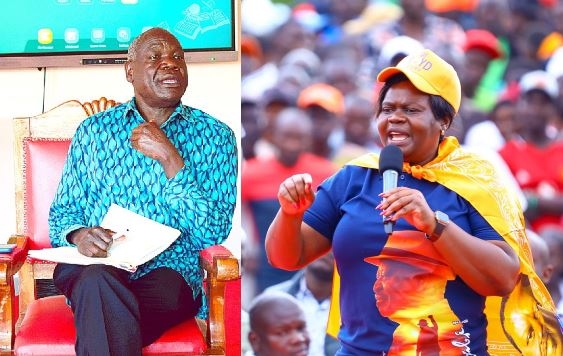
 President William
Ruto, chairs a meeting
at State House,
Nairobi on
May 23, 2025./PCS
President William
Ruto, chairs a meeting
at State House,
Nairobi on
May 23, 2025./PCS
The Cabinet is the collectivity of the President, the Deputy, all Cabinet Secretaries and the Attorney General. Principal Secretaries—despite what some newspapers think – are not members of Cabinet.
Cabinet in the constitution drafts
In various drafts of the constitution, the role of the Cabinet was expressed in different ways.
The Bomas draft said: “The executive authority of the Republic at the national level of government is vested in the President, the Deputy President, the Prime Minister and ministers”. This was very complicated – because the largely ceremonial President did not actually do much of an “executive” nature.
The Committee of Experts’ first draft clarified this, saying executive authority was exercised by the same officers or bodies, but the President (still largely ceremonial) would normally do so only “on the advice of the Cabinet”.
The constitution as adopted says the President exercises the “executive authority” “with the assistance of … the Cabinet”.
These various versions were trying to ensure that the Cabinet was recognised as a key part of the government. This is different from the American constitution, which does not mention the Cabinet, though it implies the existence of heads of government departments whose opinion the President may ask.
CSs in the Constitution
People often expect ministers to be experts in the field of the ministry they head. I think there was something of that in the original recommendation of the CKRC in 2002.
That 2002 draft said, “The President shall not appoint a Member of Parliament to the office of minister or deputy minister.” (In that draft the President was not the head of government.)
There were two other ideas: first that ministers would be able to focus on that role, without having to spend time on a constituency. Second, the head of government would be unable to use appointments to ministerial posts to “buy” the support of MPs. Sometimes Cabinets could become very large because the President (head of government under the old constitution) would use ministerial appointments to ensure support.
Another concern was that MPs should consider being an MP a worthwhile occupation, not just hoping to get a ministry. It was intended that being an MP would be a full-time job – but some MPs/Senators – especially practising lawyers and some courts, have managed to take the view that it is not full-time.
The 2004 National Constitutional Conference (Bomas) draft required all ministers to come from the National Assembly – but approved by the Senate. Unlike the CKRC, about one third of Bomas members were MPs – could that have had anything to do with the change?
The CoE’s first two drafts provided for up to ten ministers not from the National Assembly. This was completely changed of course by the shift – by MPs – to a system based on that of the US; there “no person holding any office under the United States, shall be a member of either House during his continuance in office.”
Incidentally, early drafts provided for deputy ministers (not in the Cabinet) – a concept abandoned by the Parliamentary Select Committee that shifted the whole system. Maybe the best thing they did. The High Court in 2023 declared the office of Cabinet Assistant Secretary to be unconstitutional as being “assistant ministers”.
The constitution now says that CSs – ministers renamed – must, like all non-elected state officers, be selected “on the basis of personal integrity, competence and suitability” (Article 73(2)(a)).
And the Cabinet as a whole must reflect the “regional and ethnic diversity” of Kenya (Article 130(2)) and have no more than two thirds of either gender (as held by the High Court in 2016, based on Article 27(8)).
Possible criteria
My gut reaction was to think that a major problem here is that Presidents choose CSs to reward them for their support in the past election, or to cement support among the appointee’s community.
It is sobering, therefore, to read research on how ministers are appointed in other countries (in a book Cabinets, Ministers and Gender.) Studying various countries, the authors identified three types of criteria used to identify “ministrable” appointees.
First was that question of experience. It may be experience in the particular policy area (like health or education). Or it may be political experience. The two may, or may not, overlap. Experience in a particular subject area could be political or professional.
My personal feeling is that political experience is likely to be more useful. A professional may understand some aspects, but the ministry needs an overall view. And the ministry should have employees who do just that. Political sense, ideally including the particular field, is what is really needed. But in certain fields, it is more common to have experts—such as in finance.
In parliamentary systems, ministers will almost inevitably have good political experience—because they have to be MPs. In our system, this is not true. It may have been a weakness of some Cabinet appointees.
The second group of common criteria for appointing ministers involves the personal relationship of the candidate with the person appointing—the head of government.
Issues of loyalty and ability to work together are relevant. This would include the idea of the appointee sharing the philosophy of the President (in Kenya) – though it is by no means clear that our politicians have any explicit philosophy or ideology.
That third group involves who the appointee represents—ethnic group, religion, gender, party and so on. Gender has not always been given the place the constitution requires. Even now, in a Cabinet of 25 (including the President, Deputy and the Attorney General) only six are women – so 76 per cent are men.
There are other factors, such as the ability of the person to work collegially as a member of the Cabinet and also to have good relations within the ministry he or she will head.
Our realities
While all these factors probably feature to some degree in the appointing of Kenyan CSs, it seems that the political side of the matter – using “political” in its usual Kenyan sense, which means something like “making sure I am re-elected” – is dominant.
This is an approach that bedevils our government system at both levels. Why do Presidents and governors fall out with their deputies so regularly? I suggest first that the candidates for these offices are chosen for the wrong reason – not because they will do a good job and be people their “boss” can work with, but because of their votes only.
Secondly because the “bosses” fear competition and basically prefer to be one-man bands (a point made by Henry Gichana here a few weeks ago).
If CSs are to achieve anything, they probably need to be in office for some time. Yet President William Ruto has reshuffled his Cabinet three times in the last two-and-a-half years. He has rather crudely criticised his Cabinet, saying he knows more than they do about their work.
A final issue: In a copy of The Standard newspaper on May 17, Patrick Muinde commented, “outside the constitutional limitation on the number of Cabinet Secretaries, President William Ruto has unilaterally created a parallel cabinet disguised as advisers. The appointees serve no known Cabinet level departmental responsibilities, yet draw salaries, benefits and allowances of either a Cabinet Secretary or Principal Secretary”.
The Cabinet is not democratically elected but is at least accountable to some extent to Kenyans. Its members may be removed at the insistence of the National Assembly and now appear to be questioned before that body on Wednesday afternoons. The existence of these advisers suggest that the President does not find Cabinet’s advice valuable.
This is not an issue limited to Kenya. A 2011 OECD Survey “shows that the majority of [27] countries have not developed a governance framework promoting transparency, integrity and accountability for ministerial advisors”.
















